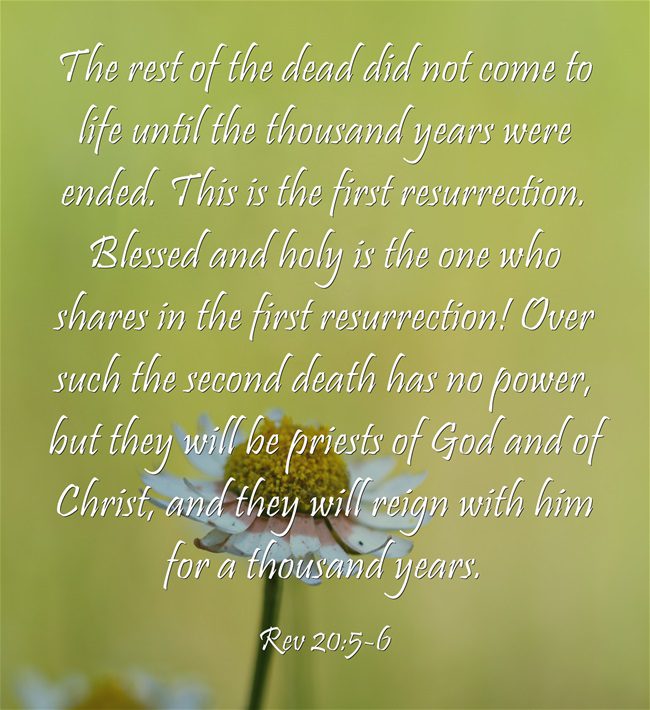What is Postmillennialism? How does it differ from a millennialism or premillennialism?
The Millennium
The word millennium simply means a one thousand year period of time. The Apostle John wrote about what most consider the millennium in Revelation 20:1-3 where John writes “I saw an angel coming down from heaven, holding in his hand the key to the bottomless pit and a great chain. And he seized the dragon, that ancient serpent, who is the devil and Satan, and bound him for a thousand years, and threw him into the pit, and shut it and sealed it over him, so that he might not deceive the nations any longer, until the thousand years were ended. After that he must be released for a little while.” John also “saw the souls of those who had been beheaded for the testimony of Jesus and for the word of God, and those who had not worshiped the beast or its image and had not received its mark on their foreheads or their hands. They came to life and reigned with Christ for a thousand years” (Rev 20:4) however, “The rest of the dead did not come to life until the thousand years were ended. This is the first resurrection. Blessed and holy is the one who shares in the first resurrection! Over such the second death has no power, but they will be priests of God and of Christ, and they will reign with him for a thousand years” (Rev 20:5-6). Those over which death has no power will share “in the first resurrection” as they’re called to “be priests of God” and these, along with the others “will reign with him for a thousand years.”
What is Postmillennialism?
Postmillennialism is the belief that Jesus does not come until after the millennium, thus the affixed “post” before the word millennial which means after. This is the very opposite of premillennial views where it’s thought that Jesus will come before the millennium or the thousand year period, at least a figurative thousand year period. Postmillenist’s would read Revelation 20 and see Jesus as coming to establish a golden age or era of Christian prosperity and dominance in the world however, it doesn’t happen until after Jesus Christ returns and it’s not necessarily a literal one thousand year time period. The error I see in postmillennialism is of those who believe that the world is going to be a better and better place over time and will lead to a blossoming of the Christian’s Golden Age because everyone’s been converted. What is problematic about this view is that evil seems to be growing worse and worse with each passing decade. The problem with the conversion of the world is that Jesus said “many are called but few are chosen” (Matt 22:14).
Other Views on the Millennium
There are only three main views of the millennium or thousand year time period and they are the a millennial view or nonmillennial view (there is no millennium at all), the premillennial view (where Christ comes before the millennium), and of course the postmillennialist which is what the previous paragraph was about. The a millennialists are not necessarily saying there’s no millennium but that the one thousand year is not a specific time period but a figurative amount of time. The important thing to me is that we should not hold to our view as to make us feel superior over those with different beliefs, because we’re not. These things should not divide us. Since the main things unite us, such as being saved by grace alone (Eph 2:8-9) and by Christ alone (Acts 4:12), we should not allow ourselves to be divided us non-essential views or things that do not affect our salvation. Thankfully, the main things are the plain things (John 3:16; Rom 10:9-12; Acts 16:30-31) and they’re simple enough for a child to understand.
Conclusion
Whether you hold to a millennial view or nonmillennial view, the premillennial view or the postmillennial view, I hope you realize that it’s best to be a “pan-millenialist,” meaning it will all pan out in the end. It is pointless to argue things that don’t affect the gospel. Far and away the most important thing to know is if you’ve repented and placed your trust in Jesus Christ. I pray that is so and if not, that you will soon before He comes again and judges all who have refused to belief.
Article by Jack Wellman
Jack Wellman is Pastor of the Mulvane Brethren Church in Mulvane Kansas. Jack is also the Senior Writer at What Christians Want To Know whose mission is to equip, encourage, and energize Christians and to address questions about the believer’s daily walk with God and the Bible. You can follow Jack on Google Plus or check out his book Teaching Children the Gospel available on Amazon.















